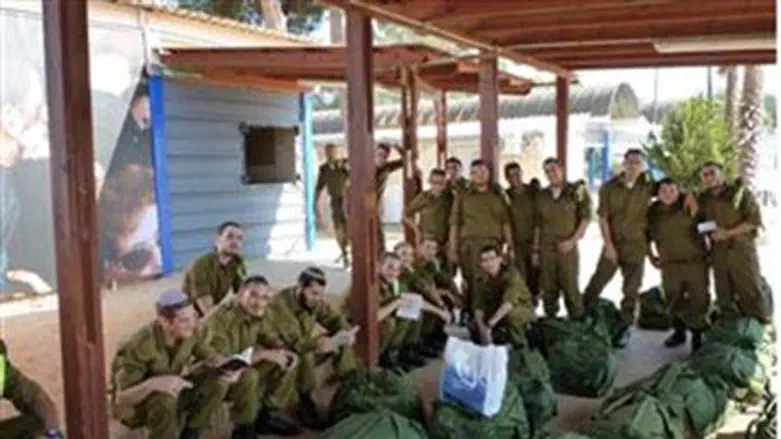
Students from hesder yeshivas throughout Israel have decided to directly approach IDF Chief of Staff Benny Gantz over the issue of women’s singing in the army.
The students have written a letter to Gantz, which has been distributed in the various yeshivas and signed by students. In the letter the students call on Gantz, military leaders and other decision makers not to break what they call the “status quo which has been in effect with great success for decades,” and not require hareidi-religious soldiers to listen to women singing.
The letter comes after Gantz ruled last week that no soldier will be allowed to absent himself from official military ceremonies, even if it conflicts with his religious observance.
Religiously observant soldiers were told they will be required to attend official ceremonies even if a performance by a female singer or dancer is included. However, soldiers will be allowed to ask their commanders for an exemption from performances during private unit parties.
The ruling presents a conflict between a religious soldier's duty to obey his military commander's orders and his duty to obey G-d.
Torah law prohibits a Jewish man from listening to a live vocal performance by a woman who is not his wife, and likewise forbids a Jewish man from watching a woman dance, who is not his wife.
The IDF ruling came following deliberations over the issue of exclusion of women, and their equality in the army, by a General Staff committee headed by IDF Personnel Directorate chief Maj.-Gen. Orna Barbivai. The issue is considered a controversial one in the military where such ceremonies are seen as a cultural unifier.
The students emphasize in the letter to Gantz that they do not oppose women’s singing in IDF ceremonies, but request that soldiers who wish to observe halakha be allowed to do so with dignity and modesty.
Last week, MK Moshe Gafni (United Torah Judaism) warned young hareidi-religious men not to enlist in the IDF programs that were geared especially for the religiously observant population -- unless the army sets protocols to ensure the recruits will be able to maintain their observance of Torah law.
“If the IDF wants to enlist hareidim, it must adjust itself to accommodate their beliefs," Gafni said in response to Gantz’s ruling.
The Chief Rabbi of the Israeli Air Force, Lt. Col. Rabbi Moshe Ravad, announced last Tuesday that he would resign from the Shachar program for enlistment of hareidi-religious men, which he has accompanied since its inception. The rabbi stated in a letter to the chief of staff and the soldiers in the program, that the reason for the move was the decision to integrate women into the program.
Chief Military Rabbi, Brigadier General Rafi Peretz, recommended the next day in response, that the IAF remove Rabbi Ravad from his post as the IAF’s Chief Rabbi. IAF Commander Maj. Gen Ido Nechushtan refused to do so, saying that Rav Ravad serves in the IAF and not in the IDF Rabbinate.
Nechushtan reportedly said that the rabbi would continue to serve as the IAF's rabbi, a job he is doing well.

